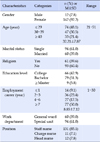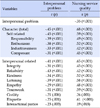Abstract
Purpose
In this descriptive correlation study, an investigation was done of the effects of interpersonal problems and character of nurses on the quality of nursing service.
Methods
The participants were 154 clinical nurses working in hospitals located in C province and D city. Data were collected from February 1 to May 31, 2018. Data analysis was performed using descriptive statistics, t-test, ANOVA, Pearson correlation coefficient, and hierarchical regression.
Results
Interpersonal problems correlated negatively with character and quality of nursing service. Character was positively correlated with quality of nursing service. Participants' age, marital status, education level, position, interpersonal problems and character explained 52.0% of variance in quality of nursing service.
Figures and Tables
Table 3
Differences of Interpersonal Problem, Character and Nursing Service Quality according to General Characteristics (N=154)

References
1. Parasuraman A, Zeithaml VA, Berry LL. Reassessment of expectations as a comparison standard in measuring service quality: Implications for further research. Journal of Marketing. 1994; 58(1):111–124. DOI: 10.2307/1252255.
2. Im BM, Park JM, Kim MJ, Kim SY, Maeng JH, Lee LL, et al. A phenomenological study on the turnover experience of novice nurses working in general hospital. Korean Journal of Occupational Health Nursing. 2015; 24(4):313–322. DOI: 10.5807/kjohn.2015.24.4.313.

3. Yeun EJ, Kim H. Development and Testing of a Nurse Turnover Intention Scale (NTIS). Journal of Korean Academy of Nursing. 2013; 43(2):256–266. DOI: 10.4040/jkan.2013.43.2.256.

4. Byeon YS, Kim M. Interpersonal conflict experience of nurses. Journal of Qualitative Research. 2009; 10(2):142–151.

5. Kim JH, Lee JS. The Experience of Clinical Nurses' Interpersonal Conflict. Journal of Qualitative Research. 2013; 14(1):70–80.

6. Back JH, Kim MH, Kim S. Perceived emotional labor of clinical nurse from the persons concerned. Korean Journal of Occupational Health Nursing. 2016; 25(3):148–155. DOI: 10.5807/kjohn.2016.25.3.148.

7. Cheong S, Lee IS. Qualitative research on nurses experiencing taeoom. Korean Journal of Occupational Health Nursing. 2016; 25(3):238–248. DOI: 10.5807/kjohn.2016.25.3.238.

8. Yeom EY. The influence of interpersonal problems, emotional labor on professional self-concept among clinical nurses. Journal of the Korea Academia-Industrial cooperation Society. 2017; 18(6):356–365. DOI: 10.5762/KAIS.2017.18.6.356.

9. The National Institute of the Korean Language. Personality [Internet]. Korean Standard Dictionary. Seoul: The National Institute of the Korean Language;cited September 15, 2018. Available from: http://stdweb2.korean.go.kr.

10. Kim S, Kim W, Ju Y. The effects of college students' character levels, on employment attitude and employment efficacy. Korean J Gen Educ. 2018; 12(1):35–56.

12. Kim JA, Chu MS, Kwon KJ, Seo HK, Lee SN. Core competencies for new nurses. Journal of Korean Clinical Nursing Research. 2017; 23(1):40–53. DOI: 10.22650/JKCNR.2017.23.1.40.

13. Park MR, Kim NC. Development of a nursing competence measurement scale according to nurse's clinical ladder in general wards. Journal of Korean Academy of Nursing Administration. 2014; 20(3):257–271. DOI: 10.11111/jkana.2014.20.3.257.

14. Park JH. Need of character education in nursing education. Journal of the Korean Data Analysis Society. 2013; 15(6):3321–3332.

15. Kim SD. Importance and satisfaction on nursing core competency of nurses & nurse managers in a community hospitals. Journal of the Korea Academia-Industrial cooperation Society. 2013; 14(6):2844–2285. DOI: 10.5762/KAIS.2013.14.6.2844.

16. Lee MA. A comparative study of how subjects' characteristics and nursing service quality influence on hospital revisiting intent between patients and nurses. Journal of Korean Academy of Nursing. 2005; 35(7):1210–1220.
17. Lee MA, Gong SW, Cho SJ. Relationship among nursing service quality, medical service satisfaction, and hospital revisit intent. Journal of Korean Academy of Nursing Administration. 2012; 18(1):96–105. DOI: 10.11111/jkana.2012.18.1.96.
18. Lee MJ, Yoon SH, Cho YC. Relationship between psychosocial factors, job stress contents, fatigue symptoms and quality of nursing services among general hospital nurses. Journal of the Korea Academia-Industrial cooperation Society. 2016; 17(8):569–581. DOI: 10.5762/KAIS.2016.17.8.569.

19. Lee MA, Kim EJ. Influences of hospital nurses' perceived reciprocity and emotional labor on quality of nursing service and intent to leave. Journal of Korean Academy of Nursing. 2016; 46(3):364–374. DOI: 10.4040/jkan.2016.46.3.36.

20. Jang R, Kang YS, Kim Y. The relationships in emotional intelligence, job satisfaction, and quality of nursing service in hospital nurses. Journal of the Korea Academia-Industrial cooperation Society. 2016; 17(6):326–337. DOI: 10.5762/KAIS.2016.17.6.326.
21. Song HJ, Lee SM. The effects of hospital nurses' self-esteem and communication skill on self-leadership and the quality of nursing service. Journal of Korean Academy of Nursing Administration. 2016; 22(3):220–229. DOI: 10.11111/jkana.2016.22.3.220.
22. Horowitz LM, Rosenberg SE, Bear BA, Ureno G, Villasenor VS. Inventory of interpersonal problems: Psychometric properties and clinical applications. Journal of Consulting and Clinical Psychology. 1988; 56(6):885–892. DOI: 10.1037/0022-006X.56.6.885.
23. Hong SH, Park EY, Kim YH. Kwon JH, Cho YR, Kim YK. Short form of the Korean inventory of interpersonal problems circumplex scales (KIIP-SC). Korean J Clin Psychol. 2002; 21(4):923–940.
24. Park JH. Development and validation of nurse's character scale for care in clinical settings. J Korean Acad Soc Nurs Educ. 2016; 22(2):137–151. DOI: 10.5977/jkasne.2016.22.2.137.
25. Joo MK. A study on the determinants of consumer-oriented nursing service quality -SERVQUAL model based- [dissertation]. Seoul: Seoul National University;2001.
26. Lee SK. The relationships of emotional labor, interpersonal problem, burnout and turnover intention of nurses [master's thesis]. Seoul: Ewha Womans University;2016.

27. An EH. The effect of separation-individuation in university students on interpersonal problems: The mediating effect of automatic thoughts. [master's thesis]. Seoul: The Catholic University of Korea;2012.

28. Ha NS, Choi J. An analysis of nursing competency affecting on job satisfaction and nursing performance among clinical nurses. J Korean Acad Nurs Adm. 2010; 16(3):286–294. DOI: 10.11111/jkana.2010.16.3.286.

29. Ko HR, Kim JH. The relationships among emotional intelligence, interpersonal relationship, and job satisfaction of clinical nurses. J Korean Acad Soc Nurs Educ. 2014; 20(3):413–423. DOI: 10.5977/jkasne.2014.20.3.413.





 PDF
PDF ePub
ePub Citation
Citation Print
Print







 XML Download
XML Download